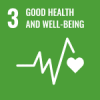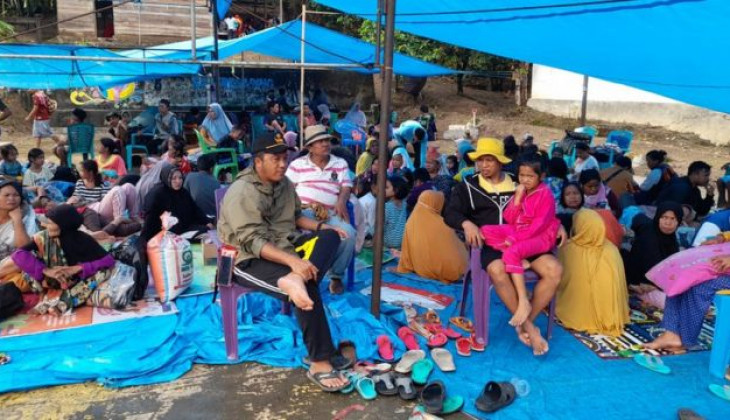Handling disasters in the current pandemic has multiplied the challenges. It requires time, effort, and costs, which is a bigger challenge than the disaster conditions during the Covid-19 pandemic.
Two speakers, Dr. Joko Murdiyanto, UGM FK-KMK alumnus from MMR, Muhammadiyah Disaster MC, and Apt. Gde Yulian Yogadhita, Consultant for the Division of MBK PKMK FK-KMK UGM, made this conclusion during the live report on “Natural Disaster Management in the Pandemic (Non-Natural Disasters)” organized by the Health Disaster Management Division PKMK FK-KMK UGM and Raisa Radio, Wednesday ( 21/1).
“The experiences of Bantul’s earthquake, Jakarta’s flood, Padang’s earthquake, Palu’s earthquake, and my experience in the Gaza Strip, are very different because there are two conditions that are very difficult to control in the field,” said Joko Murdiyanto.
Observing field conditions during the earthquake in West Sulawesi, Joko said that the current disaster in Indonesia is more vulnerable because there are two threats. This causes greatly decreased capacity because of the two threats; the threat of the earthquake disaster coupled with Covid-19.
“Yesterday, during the coordination meeting at the Crisis Center at the Health Cluster Coordination Center led by the Head of the Crisis Center, it was conveyed before the earthquake that the Covid-19 Task Force in West Sulawesi was ineffective. Especially in the current earthquake situation,” he said.
He gave an example in a tent that was less than 2 meters high and inhabited by about 15 families with a total of about 50 people. If the condition is calculated according to WHO standards with a positive case rate of 5, the number of positive cases can be estimated.
This includes the problem of handling earthquakes. There are places that until the fifth and sixth days have not been handled because they are remote areas that take 8 hours to reach, some even up to 24 hours.
“If we read about disaster management, there are 5 parties (penta helixes) involved, namely the government, society, universities, the business world, and the media. The five are expected to continue to carry out excellent coordination, cooperation, and collaboration, although this is also not easy in practice,” he explained.
From several disaster incidents, Joko explained that the volunteers involved in disaster management were extraordinary people. In their extra working conditions, the volunteers always lack sleep and eat with adequate nutrition.
Seeing the dual disaster management in West Sulawesi, he advised the volunteers to take care of their physical health as lack of sleep and malnutrition increase Covid-19 risks.
“What I want to emphasize here is rest. In several reports of Covid-19 exposure, one of the factors is the lack of rest, so at Puskor we ask for volunteers to maintain their body condition. ‘Please have rest at 22.00. Don’t go to sleep at 01.00 and wake up at 05.00, this increases the transmission risks, while we can’t track exactly how high the transmission rate is,” he added.
Having several health center visits in Mamuju, Gde Yulian said the current earthquake was entirely different. Apart from responding to the disaster, the related parties also had to pay attention to health protocols, which made handling very difficult.
He acknowledged there were evacuation points. But, these points were very different from the ones in previous disasters. According to him, the evacuation points in West Sulawesi are currently not concentrated. Many small evacuation points complicate the health center workers.
“They have to go around to the relatively not big but also not small points which consist of nuclear families. It is not easy because other families sometimes are joining. This fact is a must-know as it leads to high mobility. It is what happened in the field. A bit difficult to help health center workers to screen the affected population,” he said.
Gde Yulian said the situation in the field required more mobile type 1 IMTs. Those who joined this team had to face a different reality as the current IMT did not encounter large evacuation points with large patients, but they had to comb a large number of evacuation points.
“I think it requires a lot of time and energy from the teams that will come to the disaster site. That is the difference between disasters during and before the pandemic,” he said.
According to Gde, the disaster that occurred in Indonesia during the pandemic was a valuable lesson. Disaster management during pandemics makes self-sustainability very important, namely to try to maintain the Covid-19 service flow.
“What I found here when the disaster broke out was panic and disbandment of Covid-19 Task Force. It was similar to what happened in the Palu earthquake, where health workers and health center personnel were temporarily displaced. Though, at the same time, they were the key in Covid-19 handling. So what happened in West Sulawesi was a confusion of flow, patients, and Covid-19 information that baffled the team that came,” he said.
Doctor Bella Dona added that the Ministry of Health and the Ministry of Social Affairs have issued many disasters handling guidelines during the Covid-19 pandemic for volunteers and health workers. Thus, in the event of chaos during a disaster, to be willing to read the guidebook could complement the readiness of volunteers and health workers who were leaving for the disaster area.
She agreed that the natural disaster handling during the Covid-19 pandemic was an extraordinary situation and required much higher costs. Hence all of them had to be prepared more. For example, when some parties were about to send a health team, such as the UGM health team, there were many elements to consider.
“Usually, they can go straight away, but this time, volunteers have to be sorted first. As it is a disaster amid a pandemic, those who leave must be completely healthy, younger, and have to undergo a re-screen. Once arriving, they have to know the strategies for examining patients, whether it requires screening. Furthermore, these health workers must regularly get tested with anti-genes and nasal swabs per several days to check their latest condition. It is double handling. Hopefully, all the soon leaving volunteer teams will prepare carefully,” she added.
Source: https://ugm.ac.id/id/berita/20648-tantangan-penanganan-bencana-di-masa-pandemi-covid-19



